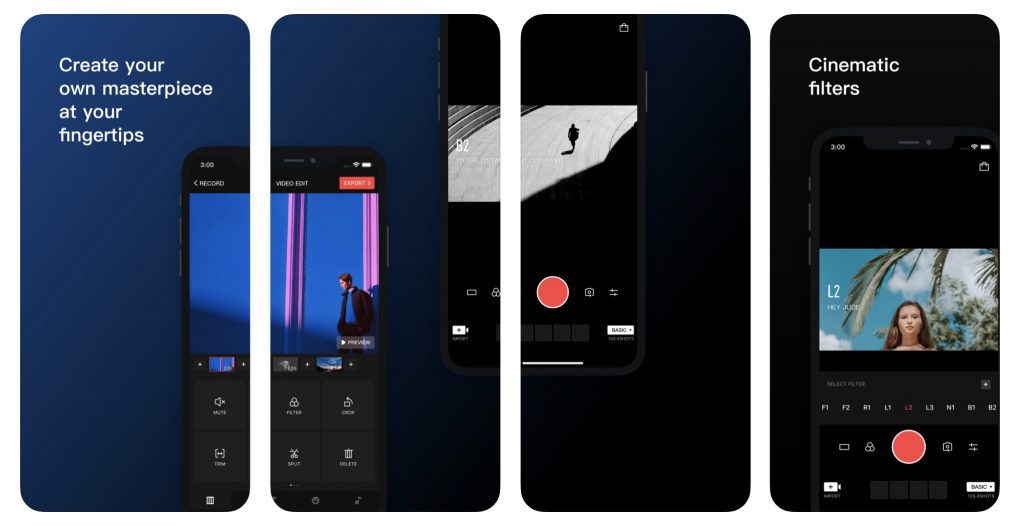Chinese short-video apps started popping up in China as early as 2016, but they really began making an impact on the country’s internet economy in 2018, when netizens spent nearly 14 hours per month on short-video content, according to financial service provider Founder Securities. Since then, these platforms have only continued to rise, garnering over 821 million monthly active users (MAU) as of June 2019, up 32% year-on-year (YoY).
Now, 2020 looks to be the year short-video apps could overtake regular video platforms as China’s main source of online entertainment. While the latter platforms—including Tencent Video, iQiyi, and Youku featuring longer video content (like Youtube does)—still had more users last year —964 million MAU— compared to short-video apps, their YoY growth was only 2.4%.
With these numbers, it is no surprise that the growth of these addicting apps has led to a plethora of offerings from internet giants and scrappy startups alike.
To give you a better insight into this trend and its main players, KrASIA has put together a list of the top platforms in the Chinese short-video app industry.
By number of MAU, the nine Chinese short-video apps are Douyin (550 million), Kuaishou (490 million), Xigua Video (270 million), Douyin Huoshan (170 million), Weishi (120 million), according to data provider Questmobile. Other popular apps, according to different data and sources, are Haokan (69 million as of June 2019 ), Quanmin (16 million as of June 2019), Pear Video (over 350,000 monthly downloads), and Vue Vlog (7.8 million monthly downloads).
Within this hyper-competitive industry, apps have come up with all sorts of distinct features and strategies to give their products an edge. From offering cash rewards to users for watching videos, to karaoke functions and built-in video editing, the world of Chinese short-video apps is a microcosm of experimentation in user experience.
Top Chinese short-video apps in 2020

1. Douyin (抖音)
Douyin, the Chinese version of TikTok, was first launched in 2016 by Beijing-headquartered startup ByteDance, a company then known for its news aggregator Jinri Toutiao. At first, the app revolved around lip-syncing over music videos, but its content soon expanded to include almost everything.
Powered by a strong recommendation algorithm honed in Jinri Toutiao, ByteDance made Douyin go viral among young people and attracted celebrity adopters, including pop star Show Lo and internet comedian Papi Jiang. In 2017, ByteDance went global with TikTok and later acquired Musical.ly, which was then already a popular app in North America among teenagers. TikTok became the second most-downloaded app worldwide in 2019, only surpassed by WhatsApp.

Douyin Features
Users can navigate content by scrolling up or down on the main page, while the videos, selected for each user using algorithmic recommendation, will play automatically. Users can show appreciation for a certain creator by following and tapping a heart icon, and can also post comments underneath the content.
Anyone can also become a creator on the platform. The “+” button allows users to post, and the app provides beauty filters, soundtracks, and video templates to create content. Douyin also has a livestreaming feature, and is reportedly testing audio livestreaming as well.
Douyin Stats
- iOS store free app rank: 12
- Monthly active users: 550 million
- Douyin had 52 million downloads in 2019 across the iOS store and Google Play (excluding third-party Android stores)
- Douyin’s DAU passed 400 million in January, 2020
2. Kuaishou (快手)
Launched in 2011, Kuaishou started out as an app for making GIFs, before the Beijing-based company transitioned their efforts to short-video content in 2013.
Known overseas as Kwai, the platform is Douyin’s biggest rival at home. It took a different approach from Douyin by targeting lower-tier cities and towns. Clips from the countryside abound as the app features a large cross-section of Chinese society, something less common on Douyin. Although expanding to feature more creators in first-tier cities, Kuaishou still retains its everyman label.

Kuaishou Features
Kuaishou’s default mode shows two rows of videos on the main page. Unlike Douyin, users choose content from these rows of thumbnails. Users can choose from dozens of categories, including short dramas, beauty, food, livestreaming, and travel. Users can also follow content creators, like videos, and write comments.
Videos from Kuaishou can be shared directly with friends on WeChat friends via the Kuaishou mini program, something not possible with Douyin’s videos, as WeChat bans them, reportedly in part due to a rising rivalry between Tencent and ByteDance.
Kuaishou Stats
- iOS store free app rank: 23
- Monthly active users: 490 million
- Kuaishou’s DAU reportedly hit 300 million before the 2020 Chinese New Year
3. Xigua Video (西瓜视频)
Xigua Video, or “Watermelon Video” in English, is ByteDance’s second short-video offering, first released in 2016 under the name “Toutiao Video”. Compared to Douyin, Xigua Video has longer content, including films and TV episodes, although it offers short-video clips and livestreams as well.
During this year’s Chinese New Year, the anticipated-box office winner Lost in Russia was released on Xigua Video after its premiere in cinemas was postponed indefinitely due to the coronavirus outbreak. The move stirred debate about online video platforms disrupting the traditional cinema industry, but bolstered Xigua’s position as a platform poised to expand in the sector.

Xigua Video Features
Xigua Video recommends content and has tabs for movies, TV dramas, gaming, vlogs, music, food, pets and more. The cinema section offers classic and indie movies for free, while Hollywood productions and other blockbusters can be rented. Users can pay RMB 6 (USD 0.85) per month to become a “Hollywood VIP,” and get full access to all content offerings.
As with most other apps on our list, users can also upload their own short videos.
Xigua Video Stats
- iOS store free app rank: 9
- Monthly active users: 270 million
- 72 million installs in March
4. Douyin Huoshan (抖音火山版)
Douyin Huoshan was launched by ByteDance in 2016, although it was just called Huoshan back then (or “Vigo Video” overseas).
Unlike Douyin, Huoshan’s videos are focused on work and daily life rather than music and entertainment, leading to a slightly older user base and comparisons to Kuaishou, also known for content revolving around similar themes. The app was upgraded with a new name, Douyin Huoshan, and new logo in January.

Douyin Huoshan Features
Huoshan’s homepage displays two rows of short videos with vertical thumbnails. After clicking a video, the app entersfull-screen mode, which allows users to scroll and see AI-recommend videos.
Like Douyin, there is also nearby and livestream content, but there is one major difference between the two apps’ features: While Douyin lets most regular users post clips up to 60 seconds long, Huoshan’s cut-off is just after 15 seconds.
A “Let’s Talk” function lets users join conversations about trending topics on the platform.
Douyin Huoshan Stats
- iOS store free app rank: 209
- Monthly active users: 170 million
- 106 million DAUs as of June 2019
5. Weishi (微视)
The Weishi app, launched in 2013, is one of the oldest short-video apps in China and is Tencent’s own homegrown platform. However, Tencent failed to popularize the format as Douyin and Kuaishou took off, and ceased operations in 2017. One year later, Tencent resurrected Weishi and geared up to take on ByteDance.
In Tencent’s fourth-quarter earnings report, the company said it stepped up investments in short-form video. As a result, the Weishi app increased its DAU by 80% and daily uploads by 70% in the reported quarter, compared to the same period in 2018. Tencent did not disclose the exact number of users.

Weishi App Features
Weishi looks a lot like Douyin and is based around a similar auto-play feed. However, Weishi incentivizes users with cash rewards to spend more time on the app. For example, if a user watches videos on Weishi for seven consecutive days, they can earn rewards up to RMB 88 (USD 12.3). Viewers can withdraw the money to their WeChat or QQ wallets.
In another Tencent integration, the app allows users to post Weishi videos less than 30 seconds long to WeChat Moments, which usually limits videos to 10 seconds.
Weishi App Stats
- iOS store free app rank: 10
- Monthly active users: 120 million
- 135.8 million installs in March
6. Haokan Video (好看视频)
Haokan Shipin, developed by search engine giant Baidu, made its debut in 2017. The Haokan app hosts short videos and livestreams across all categories and uses cash rewards to lure more users, along a similar pay-scale as Weishi. It is considered by many to be Baidu’s effort to catch up with ByteDance in the era of the mobile internet, but without having any particularly notable standout features.

Haokan Features
Haokan’s home page, unlike most apps, is based around a horizontal short-video feed, which has sections for TV dramas, livestreaming, music videos, gaming, online classes, and more. Users can also search for content by using a search bar.
By performing in-app tasks, like signing in every day, sharing videos and watching videos, users can earn virtual golden coins, which can be withdrawn to Baidu’s e-wallet. For example, watching a 15-second ad can get a user 100 coins, a currency constantly in flux (172 coins equal RMB 0.02 as of March 30) according to the app.
Haokan Stats
- iOS store free app rank: 117
- Monthly active users: 69 million as of June 2019
- 10.4 million installs in March
7. Quanmin Video (全民小视频)
The Quanmin app, or “All People” in English, is Baidu’s second short-video offering, released in 2018. Compared to Haokan, Quanmin is more Douyin-style—with a full-screen video feed and a livestreaming feature.
This app is not to be confused with Quanmin K Ge, which is a hugely popular karaoke app released by Tencent.

Quanmin Video Features
Quanmin’s main page uses the same full-screen automated scroll layout as Douyin, and gives personalized recommendations using AI algorithms from Baidu. When users swipe right, the interface will switch to nearby videos, or livestreams. In addition to built-in video editing tools that allow users to easily upload content, the app has a karaoke function which lets users sing along with soundtracks. Like Haokan, Quanmin offers cash incentives.
Quanmin Video Stats
- iOS store free app rank: 751
- Monthly active users: 16 million as of June 2019
- It gained 16.9 million downloads in March
Bonus: Promising Chinese Short-Video Apps to Watch
While the following two short-video apps might have relatively low MAU or download figures, they feature unique content amid the increasingly saturated short-video app ecosystem. For industry-watchers, these platforms are definitely a pair to note.
8. Pear Video (梨视频)
Pear Video, or “Li Shipin” in Chinese, is a short-video news app launched in 2016. Founder Shao Bing, who was formerly the CEO of news outlet The Paper, led Pear Video to rake in RMB 617 million in its Series A round in 2018 from internet giants Tencent and Baidu.

Pear Video Features
Pear Video’s homepage includes a recommended short news clips tab and local news tab, and gets its news content mainly from state-owned media outlets like Xinhua and other government official sources.
However, it also allows users to post manually-approved content, running on a model combining both professional-generated content and user-generated content. If a user wants to upload videos on the platform, it can either submit an application to open a channel on Pear Video, or upload original footage to the platform for a one-time payment from RMB 50 to RMB 500.
Pear Video Stats
- 321,480 downloads in March
- 20 million followers on official Weibo account
9. Vue Vlog
Vue Vlog, released in 2016, was previously a freemium video editor for artistic content. In 2018, the firm launched an in-app video-sharing community based around the Vue video editor app, providing a platform for its users to post their clips. Most of the footage on Vue Vlog consists of finely-edited, cinematic-style vlogs.

Vue Vlog Features
Users can trim or merge footage, adjust contrast, brightness, saturation, sharpness, as well as select from dozens of cinematic video filters and soundtracks from the app’s library.
Vue users can browse content on the main page, join channels they are interested in, and browse other users’ vlogs. The app also provides a “School”, where editing tutorials are offered.
Vue Vlog Stats
- iOS store free app rank: 627
- 7.8 million downloads in March
A note on statistics
iOS app store’s ranking of free apps was according to Chandashi, as of Feb. 27. MAU data for Douyin, Kuaishou, Xigua Video, Douyin Huoshan, and Weishi used figures from Questmobile, from January, 2020. MAU data for Haokan, Huoguo Video, and Quanmin Video were taken from Questmobile, from June 2019.
